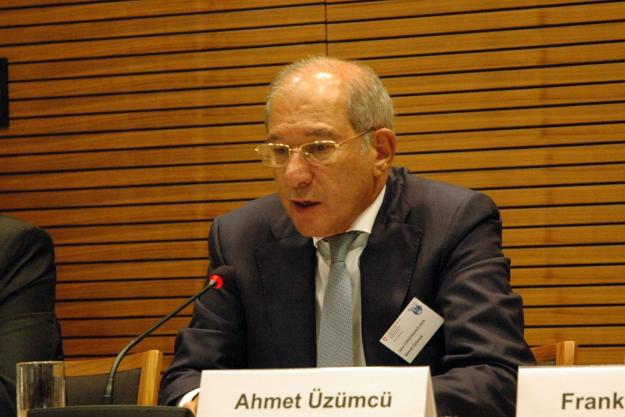
OPCW Director General Ahmet Üzümcü, speaks at Spiez CONVERGENCE workshop, held at the Spiez, Switzerland on 6 September 2016.
“Science and industry have been at the forefront of our collective endeavour to rid the world of chemical weapons ever since its inception. Looking to the future of the Chemical Weapons Convention and its implementation, the role of our partnerships with science and industry is set only to expand”, said Ambassador Ahmet Üzümcü, Director-General of the Organisation for the Prohibition of Chemical Weapons (OPCW), during his speech at Spiez CONVERGENCE workshop, held at the Spiez, Switzerland on 6 September 2016.
The Director-General emphasised that, in the future, the OPCW’s activities will focus on preventing the re-emergence of chemical weapons, with special attention being given to challenges posed by “the ambitions of terrorist groups to make and use chemical weapons.” Ambassador Üzümcü expounded upon this, declaring that, meeting this challenge will require heightened vigilance, “including ensuring that our efforts to prevent proliferation evolve with advances in science and technology, not cut across them.”
The OPCW has enjoyed a long-standing cooperation with the Spiez Laboratory who organised the workshop, and who have been an OPCW Designated Lab since 1998. The institution has contributed to the OPCW’s capacity-building efforts by hosting seminars, workshops and conferences and offered crucial assistance in sample analysis for high-profile activities related to Syria and Iraq.
Supported by the Swiss Government, the Spiez CONVERGENCE workshops bring together experts from academia, industry and policy-making. The participants focus on the latest advances and convergence between chemical and biological sciences and their potential impact upon the implementation of both the Chemical Weapons Convention and the Biological Weapons Convention.
During his visit, the Director-General met in Bern with Ambassador Alexandre Fasel, Deputy State Secretary at the State Secretariat of the Federal Department of Foreign Affairs (FDFA) and other senior officials from the FDFA and the Federal Department of Defence, Civil Protection and Sports. They discussed the implementation of OPCW decisions on Syria and Iraq as well as future priorities of the Organisation.
For more details: The Spiez CONVERGENCE workshop
